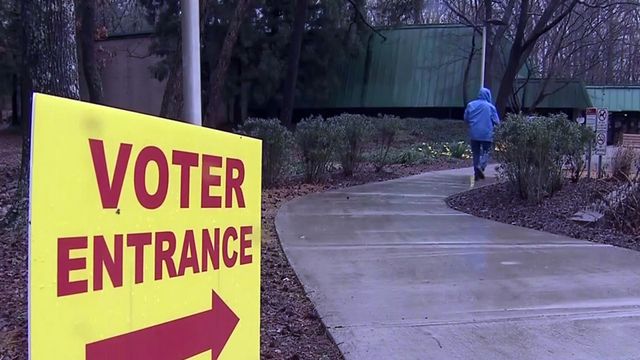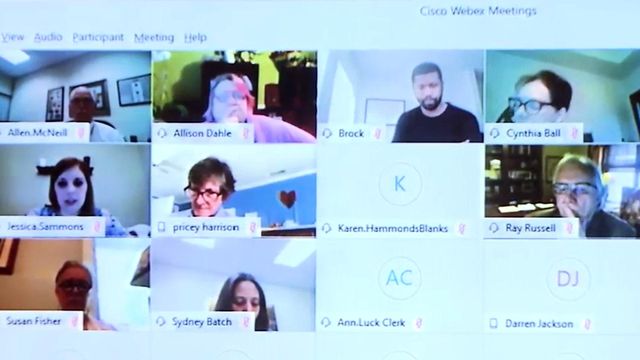Pandemic prompts lawmakers to make changes for fall elections
An elections bill responding to the coronavirus pandemic moved through two House committees Wednesday with strong bipartisan support. It's clear, however, that there's also some bipartisan discomfort with the measure.
Posted — UpdatedHouse Bill 1169 makes changes, some temporary and others permanent, to make voting by mail easier and more secure at the same time.
"Voting is going to change. Right now, we only have 5 percent usually of absentee ballot voting. We’re expecting that to be significantly higher," explained primary sponsor Rep. Holly Grange, R-New Hanover. "So, we wanted to make sure we gave the county boards of elections the resources that they needed and the guidance so that they could execute a safe election."
For 2020, the requirement of two witnesses for an absentee ballot is dropped to one witness, who is required to print his or her name and address. Voters will also be able to submit an official absentee ballot request online or by fax or email as well as by mail or in person.
The bill requires all absentee ballots to have a bar code or other unique identifier so voters and elections officials can track them.
"This will benefit the voter who wants to track their ballot and help prevent diverted ballots or fraud," Grange said.
It also specifically bars elections officials from ordering an all-mail election and makes it a felony for any elections worker to send out an absentee ballot that was not requested. It also makes it a felony to sell ballots or ballot requests or to falsify them.
Other provisions allow elections boards to hire Election Day poll workers from anywhere within a county, rather than from within a specific precinct, as long as the chief judge is from the precinct.
Grange said elections boards were having problems finding poll workers before the pandemic. Many are in high-risk groups, she added.
The proposal also allows state-issued IDs to be renewed online, like driver's licenses. In the event that the courts allow the state to reinstate its voter ID requirement, it adds federal and state IDs as well as government-issued benefit program IDs as accepted forms of ID for voting.
It also allots nearly $13 million, mostly to counties, to pay for the election and additional changes required by the pandemic, including personal protective equipment and cleaning supplies for workers.
The bill's sponsors repeatedly highlighted the "bipartisan nature" of the measure, which they said has been worked out beforehand with Senate lawmakers and the Cooper administration.
It passed the House Elections committee unanimously and the House Rules committee nearly unanimously, with only two no votes.
It's clear, however, that there's also some bipartisan discomfort with the measure.
In House Elections on Wednesday morning, Rep. Elmer Floyd, D-Cumberland, who ultimately voted for the bill, objected to the reduction of required witnesses.
"I think that two witnesses should remain because of the presidential election," Floyd said. "It’s a very important election."
"Currently, there are two witnesses required, but there’s no printed name or address. Someone could just scribble on the line and say that that’s a signature," Grange explained. "This is actually more restrictive in that the printed name and address of the witness has to be present."
"Seventy percent of North Carolinians live in households of two or less," added Rep. Pricey Harrison, D-Guilford, another primary sponsor. "So, if we’re looking at a surge in the pandemic in the fall as Dr. [Anthony] Fauci and others are predicting, it might be really impossible to have two witnesses."
In House Rules on Wednesday afternoon, Rep. Dana Bumgartner, R-Gaston, protested, "We’re just automatically making the assumption that we’re going to have a problem.
"The election is six months away," Bumgartner added. "We don’t know whether we’re going to have a problem still at that time."
Rep. Jamie Boles, R-Moore, asked whether the bill would still be in effect if Gov. Roy Cooper's executive order expires.
"I think it’s important that we be proactive on this because we don’t know what will be taking place in five months," Grange responded. "If the executive order expires, that doesn’t mean that people will not be concerned about their health."
• Credits
Copyright 2024 by Capitol Broadcasting Company. All rights reserved. This material may not be published, broadcast, rewritten or redistributed.






